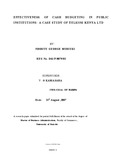Effectiveness of cash budgeting in public institutions: a case study of Telkom Kenya Ltd
| dc.contributor.author | Ndiritu, George M | |
| dc.date.accessioned | 2013-01-04T07:34:58Z | |
| dc.date.available | 2013-07-07T22:00:26Z | |
| dc.date.issued | 2007 | |
| dc.identifier.uri | http://erepository.uonbi.ac.ke:8080/xmlui/handle/123456789/7457 | |
| dc.description | MBA Thesis | en |
| dc.description.abstract | This study involved understanding the cash budget process and its effectiveness in Telkom Kenya Limited. The firm understudy is wholly owned by the government and has been in existence for over six years. Cash budget is an indispensable tool which assists organizations to manage their cash flows over a given period of time. The study therefore attempted to evaluate how the firm has employed a cash budget as a management tool. It involved understanding the cash budgeting process and its effectiveness in improving the management of cash. It also involved appreciating the role of liquidity management in the firm by ensuring sustenance of enough cash for operations while investing excess cash profitably. The study also assessed the weaknesses the firm faces in management of cash and how this management tool can be implemented as a strategy to alleviate the same. The study was done through interviewing the relevant staff using an interview guide to understand how the cash budget is prepared and used in decision making in the organization. The data collected was analyzed using descriptive statistics and historical information used as benchmark. Information relating to how the cash budget helped in forecasting cash flows and its flexibility in accommodating unbudgeted transactions assisted to evaluate cash budget effectiveness. The relevant literature was used as the benchmark to evaluate effectiveness. The study revealed that the firm ends up loosing huge cash amounts due to lack of established and operationalised mechanisms and strategies to harmonize cash collection and expenditure. There were many pitfalls with loose controls which ensured that the cash budget does not capture the total cash movement in the organization. There was also cash planning mismatch due to poor coordination between the various operationally related departments vested with management of cash. For example actualization of projects by engineers took longer than foreseen but is usually cash budgeted for. Operational expenditure also took the larger chunk of the cash generated instead of capital expenditure thus leading to dwindling cash sources in the future. To ensure the cash budget is valuable and effective, the firm needs to strive and achieve set standards. As a prerequisite also, the firm’s operations when managing cash need to be coordinated and harmonized to ensure that the cash budget objectives are achievable. | en |
| dc.language.iso | en | en |
| dc.publisher | University of Nairobi | en |
| dc.subject | Public institutions | en |
| dc.subject | Telecom Kenya | en |
| dc.subject | Cash budgeting | en |
| dc.title | Effectiveness of cash budgeting in public institutions: a case study of Telkom Kenya Ltd | en |
| dc.type | Thesis | en |
| local.embargo.terms | 6 months | en |

